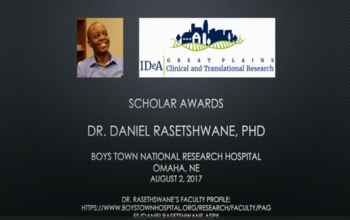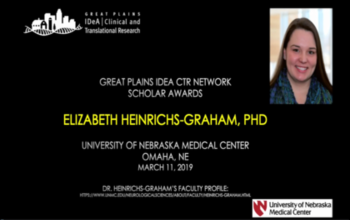
Graduate Scholar Series: Janelle Beadle, PhD
Dr. Janelle Beadle is an Assistant Professor in the Department of Gerontology at the University of Nebraska at Omaha. She is also a recipient of the 2018 Great Plains IDeA CTR Scholar Award. Get more information on her study HERE.
The Graduate Scholar Series highlights Scholar awardees who have graduated from our program by successfully obtaining extramural funding. These interviews share their research, progress, words of wisdom, and how the program has been beneficial to them.
GP IDeA-CTR: Can you briefly explain the nature of your study?
Janelle Beadle: Many informal caregivers to older adults with chronic conditions experience stress and burnout due to the physical and emotional challenges of caregiving. The purpose of my research studies are to characterize the psychological, brain and hormonal mechanisms of the caregiving experience. Ultimately, I plan to develop targeted interventions to help improve caregivers’ quality of life by reducing levels of stress, compassion fatigue and burnout.
GP IDeA-CTR: How did the Scholar’s Program help you?
Janelle: The Scholar’s Program was instrumental in advancing my career in several different ways. For instance, I received significant training in grant writing both through formal coursework led by Dr. Zimmerman, and through informal mentoring from my designated Scholar Mentors. Furthermore, this grant provided me with protected time for research that resulted in the submission of multiple grant proposals and publications. Finally, the Scholar’s Program connected me with other researchers conducting clinical and translational science in the greater Omaha region.
GP IDeA-CTR: What was the most beneficial part of the program that led you to graduating?
Janelle: The specific grant feedback I received during my formal coursework and mentoring as a Scholar played an integral role in obtaining a grant that allowed me to graduate from the IDeA CTR Scholars Program. During the formal Scholar coursework, we received multiple rounds of feedback on our grant both from our instructor and from peers who were from different training backgrounds in the class. This feedback was critical in revising my grant to prepare it for a submission to the National Institutes of Health.
GP IDeA-CTR: What funding did you receive and how will it help move your research forward?
Janelle: I received funding as a Project Leader on a COBRE Grant through the National Institutes of General Medical Sciences that allowed me to graduate from the IDeA CTR Scholars Program. This grant investigates the impact of age-related differences on the neural and behavioral bases of empathy. Through this grant, I will receive 50% salary support each year over three years, and it also includes funding for a large research project. The pilot data collected from this grant will be used to support future larger scale grant submissions, such as the R01 mechanism through the National Institutes of Health.
GP IDeA-CTR: Any words of wisdom for future Scholars?
Janelle: The IDeA CTR grant has so many useful research opportunities, for instance frequent research talks and even participant registries through which investigators can recruit participants for research studies. Even though I have graduated, I still attend relevant talks and reach out about recruitment opportunities. This has made an enormous impact on recruitment of participants for my studies, and also provides me with opportunities for continued training in clinical and translational research.
GP IDeA-CTR: What impact will your studies have on communities in the near future?
Janelle: The goal of my research studies are to better understand the psychological, hormonal, and neural mechanisms of compassion fatigue and burnout in caregivers to older adults with chronic conditions. Once these mechanisms are further characterized, I plan to develop targeted interventions designed to reduce compassion fatigue and burnout in caregivers. I also enjoy giving community talks in the greater Omaha area to share my research findings and discuss the current research on caregiver stress and brain health. For instance, this past summer I gave a talk for AARP Nebraska on maintaining brain health as we age.
GP IDeA-CTR: What sort of results have you seen in your study so far?
Janelle: At this time, our results are preliminary as the next step will be to replicate and extend our findings in a larger sample. In our study, we found that caregivers to older adults with chronic conditions reported experiencing higher levels of empathy in the moment towards strangers in response to different social settings, as compared to non-caregivers. Among the group of caregivers, we also found preliminary evidence that changes in a hormone-related to the stress response (cortisol) were associated with greater helping behaviors towards others.



